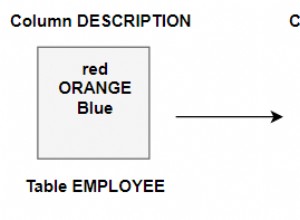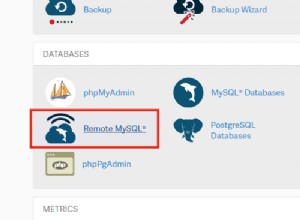Veuillez ignorer tout risque de sécurité avec cette approche
Ne fais pas ça comme ça . Peu importe que la sécurité vienne avant ou après. Vous finirez par réécrire tout le code car le mot de passe est codé en dur dans votre application qui peut être décompilé et récupéré facilement . Effectuez la connexion dans le bon sens maintenant afin de ne pas avoir à réécrire toute l'application.
Exécutez votre commande de base de données sur votre serveur avec php, perl ou tout autre langage avec lequel vous êtes à l'aise, mais cela doit être fait sur le serveur.
Depuis Unity, utilisez le WWW ou UnityWebRequest class pour communiquer avec ce script, puis vous pourrez envoyer et recevoir des informations de Unity vers le serveur. Il existe de nombreux exemples. Même avec cela, vous devez toujours implémenter votre propre sécurité, mais c'est bien mieux que ce que vous avez maintenant.
Vous pouvez également recevoir plusieurs données avec json.
Vous trouverez ci-dessous un exemple complet de ce wiki Unity. Il montre comment interagir avec une base de données dans Unity en utilisant php côté serveur et Unity + C# côté client.
Côté serveur :
Ajouter un score avec PDO :
<?php
// Configuration
$hostname = 'localhot';
$username = 'yourusername';
$password = 'yourpassword';
$database = 'yourdatabase';
$secretKey = "mySecretKey"; // Change this value to match the value stored in the client javascript below
try {
$dbh = new PDO('mysql:host='. $hostname .';dbname='. $database, $username, $password);
} catch(PDOException $e) {
echo '<h1>An error has ocurred.</h1><pre>', $e->getMessage() ,'</pre>';
}
$realHash = md5($_GET['name'] . $_GET['score'] . $secretKey);
if($realHash == $hash) {
$sth = $dbh->prepare('INSERT INTO scores VALUES (null, :name, :score)');
try {
$sth->execute($_GET);
} catch(Exception $e) {
echo '<h1>An error has ocurred.</h1><pre>', $e->getMessage() ,'</pre>';
}
}
?>
Récupérer le score avec PDO :
<?php
// Configuration
$hostname = 'localhost';
$username = 'yourusername';
$password = 'yourpassword';
$database = 'yourdatabase';
try {
$dbh = new PDO('mysql:host='. $hostname .';dbname='. $database, $username, $password);
} catch(PDOException $e) {
echo '<h1>An error has occurred.</h1><pre>', $e->getMessage() ,'</pre>';
}
$sth = $dbh->query('SELECT * FROM scores ORDER BY score DESC LIMIT 5');
$sth->setFetchMode(PDO::FETCH_ASSOC);
$result = $sth->fetchAll();
if(count($result) > 0) {
foreach($result as $r) {
echo $r['name'], "\t", $r['score'], "\n";
}
}
?>
Activer la politique inter-domaines sur le serveur :
Ce fichier doit être nommé "crossdomain.xml" et placé à la racine de votre serveur web. Unity exige que les sites Web auxquels vous souhaitez accéder via une requête WWW aient une politique inter-domaines.
<?xml version="1.0"?>
<cross-domain-policy>
<allow-access-from domain="*"/>
</cross-domain-policy>
Côté client/Unity :
Le code client de Unity se connecte au serveur, interagit avec PDO et ajoute ou récupère le score en fonction de la fonction appelée. Ce code client est légèrement modifié pour être compilé avec la dernière version de Unity.
private string secretKey = "mySecretKey"; // Edit this value and make sure it's the same as the one stored on the server
public string addScoreURL = "https://localhost/unity_test/addscore.php?"; //be sure to add a ? to your url
public string highscoreURL = "https://localhost/unity_test/display.php";
//Text to display the result on
public Text statusText;
void Start()
{
StartCoroutine(GetScores());
}
// remember to use StartCoroutine when calling this function!
IEnumerator PostScores(string name, int score)
{
//This connects to a server side php script that will add the name and score to a MySQL DB.
// Supply it with a string representing the players name and the players score.
string hash = Md5Sum(name + score + secretKey);
string post_url = addScoreURL + "name=" + WWW.EscapeURL(name) + "&score=" + score + "&hash=" + hash;
// Post the URL to the site and create a download object to get the result.
WWW hs_post = new WWW(post_url);
yield return hs_post; // Wait until the download is done
if (hs_post.error != null)
{
print("There was an error posting the high score: " + hs_post.error);
}
}
// Get the scores from the MySQL DB to display in a GUIText.
// remember to use StartCoroutine when calling this function!
IEnumerator GetScores()
{
statusText.text = "Loading Scores";
WWW hs_get = new WWW(highscoreURL);
yield return hs_get;
if (hs_get.error != null)
{
print("There was an error getting the high score: " + hs_get.error);
}
else
{
statusText.text = hs_get.text; // this is a GUIText that will display the scores in game.
}
}
public string Md5Sum(string strToEncrypt)
{
System.Text.UTF8Encoding ue = new System.Text.UTF8Encoding();
byte[] bytes = ue.GetBytes(strToEncrypt);
// encrypt bytes
System.Security.Cryptography.MD5CryptoServiceProvider md5 = new System.Security.Cryptography.MD5CryptoServiceProvider();
byte[] hashBytes = md5.ComputeHash(bytes);
// Convert the encrypted bytes back to a string (base 16)
string hashString = "";
for (int i = 0; i < hashBytes.Length; i++)
{
hashString += System.Convert.ToString(hashBytes[i], 16).PadLeft(2, '0');
}
return hashString.PadLeft(32, '0');
}
Ceci est juste un exemple sur la façon de le faire correctement. Si vous avez besoin d'implémenter une fonctionnalité de session et que vous vous souciez de la sécurité, consultez OAuth 2.0 protocole. Il devrait y avoir des bibliothèques existantes qui vous aideront à démarrer avec OAuth protocole.




